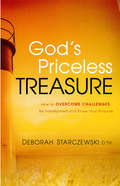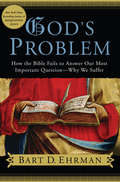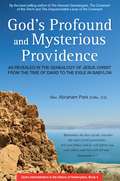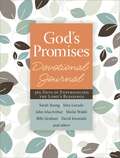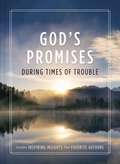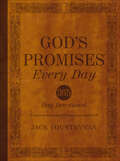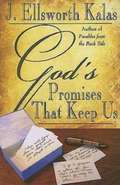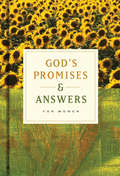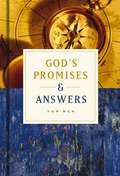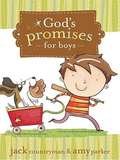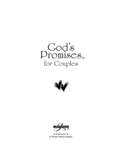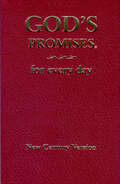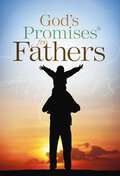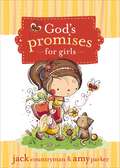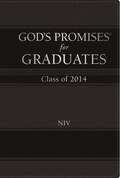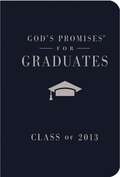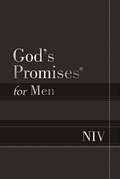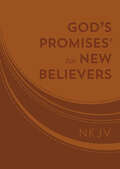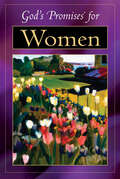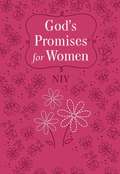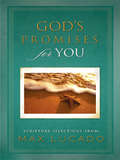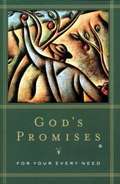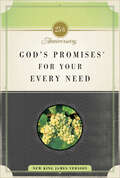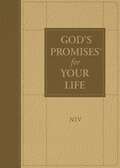- Table View
- List View
God's Priceless Treasure: How to Overcome Challenges, Be Transformed and Know Your Purpose
by Dr. Deborah StarczewskiFind out that God sees each one of us as a priceless treasure and will supernaturally intervene in our lives. Author Deborah Starczewski shares through personal experience and inspiring stories just how miraculous God&’s intervention can be. She encourages you to seek God for yourself as she shares her wisdom and insight into the heart of God. These life experiences of redemption and restoration give hope to all.
God's Problem: How the Bible Fails to Answer Our Most Important Question--Why We Suffer (The A to Z Guide Series, No. 194)
by Bart D. EhrmanOne Bible, Many AnswersIn God's Problem, the New York Times bestselling author of Misquoting Jesus challenges the contradictory biblical explanations for why an all-powerful God allows us to suffer.
God's Profound and Mysterious Providence
by Abraham ParkThe fourth book in the History of Redemption Series by Rev. Abraham Park, God's Profound and Mysterious Providence: As Revealed in the Genealogy of Jesus Christ from the time of David to the Exile in Babylon begins with accounts of King David and Solomon, then continues into the era of divided kingdoms: the northern kingdom of Israel and the southern kingdom of Judah. This book illustrates the reigns and lives of the kings from the perspective of God's administration for redemptive history.
God's Profound and Mysterious Providence
by Abraham ParkThe fourth book in the History of Redemption Series by Rev. Abraham Park, God's Profound and Mysterious Providence: As Revealed in the Genealogy of Jesus Christ from the time of David to the Exile in Babylon begins with accounts of King David and Solomon, then continues into the era of divided kingdoms: the northern kingdom of Israel and the southern kingdom of Judah. This book illustrates the reigns and lives of the kings from the perspective of God's administration for redemptive history.
God's Promises Devotional Journal: 365 Days of Experiencing the Lord's Blessings
by Jack CountrymanA guided journal to lead you through the promises God has for every believer.More than 20 of our leading Christian authors bring inspiration andencouragement every day of the year. Guided questions and commentarygentlylead the way for personal meditation and reflection on God's promisesfor yourlife. Journaling space is provided for recording your thoughts andprayers, and for promoting quality quiet time alone with the Lord.
God's Promises During Times of Trouble: Encouragement and Inspiration for Life's Most Difficult Challenges
by Jack CountrymanFind the comfort you need when your life feels like it is falling apart.Where do you turn to when you need hope, encouragement, and comfort during your most difficult times? God's Word is the best place to start.When you are faced with grief, pain, or loss it's often hard to find comfort and support. God's Promises® During Times of Trouble provides 50 topics of select biblical promises of comfort and hope during the difficulties that leave us needing healing and reassurance. Whether you're struggling with illness, loss, divorce, confusion, doubt, or any difficult situation that leaves you with a feeling of despair, the promises found in God's Word bring abundant encouragement, inspiration, and hope.A volume in the popular God's Promises® line of resources, this keepsake expanded edition features:Fifty topics covering a wide variety of issues affecting today's Christian such as loneliness, isolation, stress, anger, doubt, financial difficulties, marital problems, and many more.Hundreds of Bible verses (NKJV translation) specially collected to speak directly to you.Inspirational quotes from respected Christian authors.Key verses perfect for memorization and reflection.Reflection questions and journaling lines for applying biblical principles to your everyday challenges. Scripture is one of the most powerful tools for finding inspiration to uplift and nourish your heart and soul through life's most challenging times. And God's Promises® During Times of Trouble will help you lean on God's Word and find the hope you crave.
God's Promises Every Day: 365 Day Devotional (God's Promises® Ser.)
by Jack CountrymanTimes of change, trouble, or doubt can leave us looking for answers, wondering what God says about our situation. Millions have trusted Jack Countryman books based on the promises of God. His first 365-day devotional—God's Promises® Every Day—brings encouragement and assurance through Scripture and writings about the promises God has for your life.In God's Promises® Every Day, bestselling author Jack Countryman brings encouragement from the Scriptures to draw readers closer to what God has affirmed for them. This beautifully designed daily devotional offers readers a unique experience they will use and cherish throughout the year.
God's Promises That Keep Us
by J. Ellsworth Kalas"In the case of this book, I can tell you not only when it came to birth but also where. It was in a quite modest kitchen at 1506 Center Street in Sioux City, Iowa, over a period of years in the late 1930s. On a shelf in that kitchen, just above the stove, was a box of cards, each measuring roughly one by three inches, each one containing a verse from the Bible. The box was popularly referred to as “precious promises.” I don’t know if that was the name the publisher gave to the collection or if it was the title earnest Christians had given to such verses long before an enterprising publisher organized a specific collection into printed form; I only know how sacred and beloved the box was to my mother and to untold thousands of other persons at that time. The verses covered a wide area of biblical teaching. Many had a quality of admonition and instruction, but the overall mood was one of encouragement. Those who kept such a box in easy reach were sustained by the contents. Some verses took on such personal significance that they were laid aside on top of the box or beside it, to be looked at more often. Mind you, the owner of the box knew such verses by heart, but there was a peculiar strength in looking at the printed form and holding it in one’s hand. And I might add that by the time she took her “promise for the day” she would already have prayed on her knees and have read a longer portion from the Bible. I revered those promises because they meant so much to my parents, especially my mother, and because on several occasions I had seen how uniquely appropriate a particular verse proved to be at a particular time. That Center Street box has now been lost for half a century or more, so I can’t promise that the verses I embrace in this book were all in that box. The Bible verses I’ve included in this book are verses that have blessed me over the years, and I dare to believe that some or all of them will give a lift or a thought to you. Some have become significant to me in times of pain, some in joy. When you read this book, I’m very sure you will think of a verse that is priceless to you, and you’ll wonder why it’s not in this book. The verse may mean so much to you that perhaps you will reprimand me, even if kindly, for not including it. If you do, I’ll understand. I’ll just know that, whether or not you’ve ever seen a box of precious promises, you have discovered that there are promises that keep us. And I will thank God with you that you have found it to be so." (J. Ellsworth Kalas, adapted from the foreword) This book will contain a discussion guide.
God's Promises and Answers for Women
by Jack Countryman Terri GibbsWomen searching for God's direction need look no further than J. Countryman's God's Promises and Answers for Women. A handbook for the many roles and responsibilities of a woman, this new volume combines the wisdom and truth found in God's Promises for Women and God's Promises for Mothers, both of which have sold in excess of one million copies. This 400 page book is specially priced at $4.99 and covers topics such as: Trusting God His Divine Protection Rejoicing in the Lord Understanding God's Ways Obtaining God's Promises Giving with Grace
God's Promises and Answers for Women
by Jack CountrymanWomen searching for God's direction need look no further than J. Countryman's God's Promises and Answers for Women. A handbook for the many roles and responsibilities of a woman, this new volume combines the wisdom and truth found in God's Promises for Women and God's Promises for Mothers, both of which have sold in excess of one million copies. This 400 page book is specially priced at $4.99 and covers topics such as: Trusting God His Divine Protection Rejoicing in the Lord Understanding God's Ways Obtaining God's Promises Giving with Grace
God's Promises for Boys
by Jack CountrymanAn easy way to help young boys see God's promises and how they can rely on His love in their daily lives. The promise verses in this book are selected from the bestselling International Children's Bible®to offer comfort and encouragement when a boy is feeling afraid,lonely, worried, angry, dissatisfied, discouraged, sad, rebellious,impatient, or sick . . . and when they need reassurance of God'sprotection, love, forgiveness, help . . . and that He listens when theypray. It's a great way for children to hide God's Word in their hearts. Sample text: Sometimes it's hard to tell the truth when you feel like youhave something to hide. But remember--when it's hard to be honest: God promisesto reward Truth--not Lies!"You must do thesethings to enjoy life and have many happy days. You must not say evil things.You must not tell lies." Psalms 34:12-13
God's Promises for Couples
by Jack CountrymanGod's Promises for Couples, is a book of wonderful promises that can read together! This collection of Scripture verses from the New King James Version brings couples closer to the Word of God and each other. Couples will find passages on a variety of topics, such as: God's Plan for Couples, Worshipping God, Asking Forgiveness, Having Joy in God, and many more.J. Countryman is celebrating the 20th anniversary and the 11 million lives touched by the God's Promises line. Holding steadfast to the company's mission, Touching Lives...Changing Lives, the God Promises line continues to be the anchor of the J.Countryman brand.
God's Promises for Every Day
by Thomas NelsonGod's Promises® for Every Day by Jack Countryman quickly guides you to helpful verses for your everyday needs, whether you're seeking God's promises and answers for your own life or for a friend.No matter what season of life we are in, we need reassurance of God's promises to us--reminders that God is with us, ready to meet our needs with His love, provision, and direction. God's Promises for Every Day provides:A collection of hundreds of versesShort readings and prayers which make it a perfect companion for time alone with GodVerses to address every season of life and answer readers' most pressing questionsScriptures to comfort in times of worry, offer direction in times of crisis, and reassure you of God's love in times of discouragementWhether you're considering this for a gift or self-purchase, you should know God's Promises for Every Day is:Perfect for men and women of all agesA quick and easy-to-use Scripture referenceWith 15 million copies of God's Promises® books sold, Jack Countryman is a perfect guide for when you crave a word of encouragement or you need biblical direction. When you live with God's promises in your life, you will be blessed beyond your wildest imagination.
God's Promises for Fathers: New King James Version
by Jack CountrymanScripture promises from the New King James Version offer timeless guidance and wisdom for fathers. This collection of parenting promises from God's Word will uplift, comfort, and renew fathers by reminding them that He is the Ultimate Father and He understands their needs. The topical arrangement provides quick and easy access to verses pertaining to each theme, giving spiritual insight and Godly direction at a glance. Having these promises at hand will reinforce and sustain every father who seeks God's will for them and their children. Note: Must be ordered in multiples of 24. Self-shipping box can be used as counter display. To order shrink-wrapped bundles without display box, use ISBN 978-1-4041-9013-9.
God's Promises for Girls
by Jack CountrymanAn easy way to help young girls see God's promises and how they can rely on His love in their daily lives. The promise verses in this book are selected from the best-selling International Children's Bible®to offer comfort and encouragement when a girl is feeling afraid,lonely, worried, angry, dissatisfied, discouraged, sad, rebellious,impatient, or sick . . . and when they need reassurance of God'sprotection, love, forgiveness, help . . . and that He listens when theypray. It's a great way for children to hide God's Word in their hearts.Sample text: Monsters. Spiders. Being alone. Do any of these things makeyou feel afraid? When you start to feel fear, hold on tight to these words: Godpromises to take your fear away!"So don't worry,because I am with you. Don't be afraid, because I am your God. I will make youstrong and will help you. I will support you with my right hand that saves you."Isaiah 41:10
God's Promises for Graduates: 2014
by Jack CountrymanThe bestselling inspirational graduation book, now available for the first time ever in the New International Version®.To be successful in their journey, high school and college graduates need insightful wisdom and God's direction as they tackle new challenges and embrace new opportunities. God's Promises® for Graduates is the perfect gift for graduates, providing encouragement and direction in their faith for a brand-new road in life! For over 30 years, the God's Promises series--which has sold more than 15 million copies--has been guiding and comforting people through topically arranged Scriptures addressing many facets of life. This book includes major topics such as character, integrity, loyalty, focus, respect, perseverance, and more. This keepsake gift has "2014" stamped in platinum foil with a special section for journaling, ribbon marker, and silver-gilded edges. Year after year, God's Promises for Graduates is the bestselling title for the graduation season!Features & Benefits:The bestselling inspirational graduation book since 2008, more than 800,000 sold, now in the popular New International Version®Filled with powerful reminders of promises for the five million students who are graduating this yearA fabulous value with leathersoft over hardcover binding, rounded corners, ribbon marker, and gilded edges--all for under $15Cards are forgotten and pens get lost, but this classic gift will be a lifelong keepsake
God's Promises for Graduates: Class of 2013 - Navy
by Jack CountrymanEncouragement and direction for a brand-new road in life. Embrace God's powerful promises for you as you leave one road and set your course on another . . . exciting, new, and rich with opportunity. God's Promises® for Graduates 2013--on topics such as confidence, discipline, faith, and wisdom--direct your steps and light your path in God's Holy Word. This little book will help steer graduates in God's will as they embark on their new journey in life.
God's Promises for Men NIV: New International Version
by Jack CountrymanThe timeless wisdom of God's Promises, now available in the popular NIV translation.God's Promises for Men NIV is the perfect companion for men who desire to strengthen their spiritual walk. Scripture topics include worship, accountability, and victory over sin to equip men to achieve their personal and spiritual best. This attractive and modern new edition in the bestselling God's Promises series is designed to engage men on a journey of God's power and presence in their own lives.Topics include:Peace in Troubled TimesWorshiping GodAsking Forgiveness of OthersBeing AccountableAnticipating Christ's ReturnBeing Secure Amid Job ChangePraying with FamilyDynamic Examples of Godly Men from the BibleFeatures & Benefits:Scripture selections for men looking to build their lives God's wayTopically divided scriptures speak to many topics men faceNIV translationDynamic examples of godly men in the BibleBeautiful, timeless, and masculine leathersoft packagePart of the bestselling God's Promises® line, with over 18 million units sold
God's Promises for New Believers
by Jack CountrymanA new book for new believersùdestined to become a classic!A new life in Christ is something to be celebrated. Brand-new believers are overflowing with excitement and anticipation about their new journey of faith. They deserve a meaningful guidebook that will help them know where to turn for the wonderful things God has promised for them throughout scripture. Divided topically and filled with Scripture promises and teachings for new Christians, this book is a wonderful gift for anyone who has recently become a new believer.For more than thirty years, the GodÆs Promises« seriesùwhich has sold more than 15 million copiesùhas been guiding and comforting people through topically arranged scriptures addressing many facets of life.This promise book features short, topically based chapters teaching readers about the basics of their newfound faith. Interwoven within each chapter are scripture verses that address questions and topics that specifically answer the needs of new believers. This book will bring biblical answers to many questions new believers face, offering encouragement, hope, and a taste of the abundant promises of God for those who believe in Him.Sample topics include:New believers in the faithWhat is salvation?What to do when you need wisdomHow to overcome temptation Trim Size: 4.5 x 7.125
God's Promises for Women
by Jack CountrymanBestselling God's Promises® with more than 15 million sold--now available in New International Version®. Nothing sets our minds and hearts at ease like the promises of God from His Word. For more than 25 years, the bestselling God's Promises line has put those promises at reader's fingertips. Now a new version offers those words of comfort and hope for women from the New International Version. The promises are grouped by topic, offering hope for times such as feeling overwhelmed, waiting on God, needing to know God's views on forgiveness, or growing spiritually. Whatever the need, whatever the question, God's Word answers with a promise. Features & Benefits:This bestselling series now features Scripture chosen just for women from the New International Version®Over 15 million copies sold in the God's Promises® lineEvery life situation is covered with Scripture, and this book gives readers biblical truths for every needConvenient resource filled with life-changing assurances for women
God's Promises for Women: New International Version
by Jack CountrymanBestselling God’s Promises® with more than 15 million sold—now available in New International Version®. Nothing sets our minds and hearts at ease like the promises of God from His Word. For more than 25 years, the bestselling God’s Promises line has put those promises at reader's fingertips. Now a new version offers those words of comfort and hope for women from the New International Version. The promises are grouped by topic, offering hope for times such as feeling overwhelmed, waiting on God, needing to know God’s views on forgiveness, or growing spiritually. Whatever the need, whatever the question, God’s Word answers with a promise. Features & Benefits:This bestselling series now features Scripture chosen just for women from the New International Version®Over 15 million copies sold in the God’s Promises® lineEvery life situation is covered with Scripture, and this book gives readers biblical truths for every needConvenient resource filled with life-changing assurances for women
God's Promises for You
by Max LucadoWith over one million units sold of the original God's Inspirational Promises, this revised and redesigned LeatherSoft version is sure to be another popular bestseller. A wide variety of wise and heart-warming writings from Max Lucado's best-selling works accompanies Scripture selections from Max.
God's Promises for Your Every Need
by A. L. GillUsing the King James Version of the Holy Bible as his reference, Dr. Gill gathers Scriptures together for a variety of subject such as personal peace, Jesus as forgiveness, Jesus as your righteousness and many more. This is a useful tool for subject studies of popular Christian topics.
God's Promises for Your Every Need: 25th Anniversary Edition
by Thomas NelsonCelebrating the 25th Anniversary of God's Promises--over 15 million sold--God's Promises for Your Every Need now features scripture in NKJV and a soft, richly colored leather-like casing. You will find comfort and hope in God's Word. No matter what your situation, God has a promise for you!
God's Promises for Your Life: New International Version
by Jack CountrymanNo matter what your situation, God has a promise for you! Nothing sets our minds and hearts at ease like the promises of God from His Word. For more than 25 years, the bestselling God's Promises® line has put those promises at your fingertips. Now, a new version offers those words of comfort and hope directly from the New International Version. The promises are grouped by topic, offering hope for such times as when you feel discouraged, when you are waiting on God, when you need to know God's views on forgiveness, or when you want to grow spiritually. Whatever your need, whatever your question, God's Word can answer with a promise.
